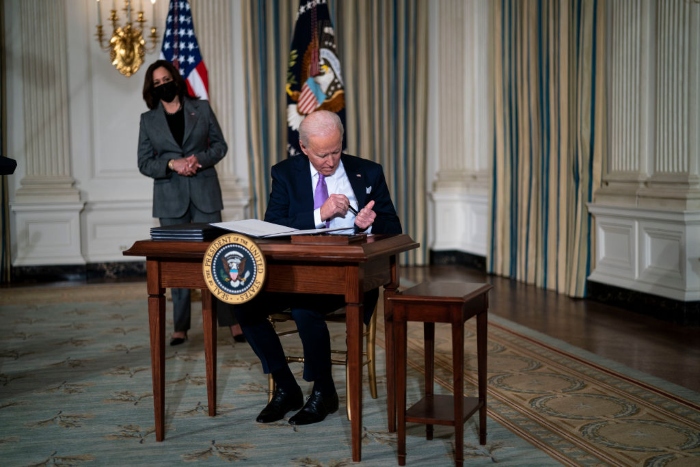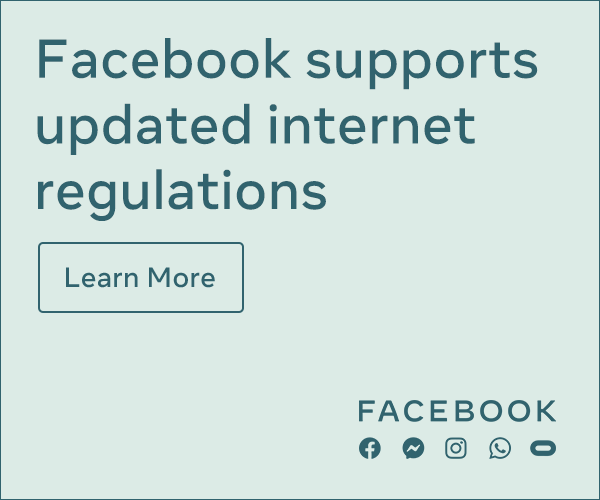| | | |  | BY SAM STEIN | Presented by Facebook | With help from Renuka Rayasam and Myah Ward NEVER TWEET — If President Joe Biden’s first week in office has given off the scent of a highly scripted affair, that’s because it was one. His team has been crafting each day around themes. Today’s was racial equality, with the president issuing executive orders to, among other things, transition the federal government away from the use of private prisons. Tomorrow will be about climate change. Later in the week will come an offering on immigration. Each day will involve a slate of unilateral actions, a background briefing with reporters and a press appearance by a top aide, or, perhaps, the head honcho himself. All of this is known because there is a memo circulating around Washington newsrooms that lays out a semi-detailed schedule for Biden’s executive action blitz. No publication has printed it because it reads as incomplete and partially inaccurate: a number of the actions listed on it have already come on different days. But several sources close to the White House confirmed that the document — even though clearly a draft — was authentic. In total, the memo outlines an ambitious attempt at effecting social change from the Oval Office. But it also shows a White House making a gamble of sorts: that it can apply traditional communication methods to a nontraditional media climate. Biden could theoretically have released all the executive orders and actions on his first day in office or over a more compressed window. Instead, his team chose to dribble them out over the course of more than a dozen days, with most of those days having separate themes. There is Covid, Economic Relief, Buy America, Equity, Climate, Health Care, Immigration and “Restoring America’s Place in the World” (a project the memo reserves for February).
| 
President Joe Biden signs executives orders related to his racial equity agenda in the State Dining Room of the White House. | Getty Images | The reason for moving slowly and thematically is simple: They want to program the news coverage of their opening weeks in office. This is standard operating procedure for any White House. At least, it was for all of the ones in memory other than Donald Trump’s. And that’s precisely what makes this strategy a rather complex one for Biden’s team. They’re coming in right after the most impulsive, id-driven president in history. Even when it was operating at its most cohesive and organized level, Trump’s White House didn’t program its days. It couldn’t. His Twitter feed did, announcing abrupt firings, new policy initiatives, political fights and media quarrels that completely disrupted any carefully laid plans his team had tried to put together. In turn, the White House press corps became intoxicated — and, perhaps, overdosed a few times — on his quick-change programming. The challenge facing Biden’s comms team over the next four years is figuring out not just how to detox the press, but also whether they even can, and whether that actually matters. To some degree, they are already seeing the perils of the hyper-kinetic national media climate that Trump exploited more than created. Biden allies privately bristle at stories on the president’s Rolex watch and Peloton, as well as what they see as bad-faith coverage over whether he’s instantly achieving his calls for unity. But their larger conviction is, as Biden’s 2020 candidacy seemingly proved, that these Twittering-class stories are gnats that should best be ignored. And so they’re sticking to an orchestrated plan of thematic days based around executive orders — an approach that seems positively quaint now, but one that veterans say will do them much good. “Not all news stories are good news stories, and a lot of stories for Trump were dumpster fires,” is how David Axelrod, Barack Obama’s former top comms hand, explained it to me. “What you want to do is just convey a constant sense of action and competence, especially on those things plaguing the country.” Welcome to POLITICO Nightly. Reach out at sstein@politico.com and rrayasam@politico.com, or on Twitter at @samstein and @renurayasam.
| |
| | A message from Facebook: We support updated internet regulations
We support updated internet regulations to set clear rules for addressing today’s toughest challenges including:
— Protecting people's privacy
— Enabling safe and easy data portability between platforms
— Preventing election interference
— Reforming Section 230
Learn More | | | | | | 
Beatrice Jin | WHO’S STRONG AND FREE IN THE TRUE NORTH — Canadian Prime Minister Justin Trudeau’s government needs to get vaccines into arms while accelerating its efforts to rebuild the economy. With multiple players and power brokers in the mix — along with many unknowns — Maura Forrest, Lauren Gardner, Rachel Browne and Beatrice Jin explain who holds influence in Ottawa during what many expect will be an election year.
| |
| | TRACK THE FIRST 100 DAYS OF THE BIDEN ADMINISTRATION: A new president occupies the White House and he is already making changes. What are some of the key moments from Biden's first week in office? Find out in Transition Playbook, our scoop-filled newsletter tracking the appointments, people, and emerging power centers of the first 100 days of the new administration. Subscribe today. | | | | | | | THE RIGHTWARD SWING OF PA’S GOP — Pennsylvania once stocked D.C. with a steady stream of establishment Republicans. Now, in the wake of Trump’s reelection defeat, it’s better known for its GOP hard-liners — among them, Scott Perry, the congressman who recently made headlines for his behind-the-scenes efforts to assist Trump’s efforts to overturn the 2020 election results in Georgia. The state GOP’s transformation from the party of former Sens. Arlen Specter and John Heinz — and Govs. Dick Thornburgh and Tom Ridge — to a bastion of Trump loyalists has been decades in the making, Holly Otterbein writes. But the shift has perhaps never been so obvious as in the past two months when Republicans here were repeatedly thrust into the spotlight for their role in trying to override Biden’s victory. “It’s not the party that I belonged to years ago,” said Robert Byer, a former Republican judge and legal counsel for George H.W. Bush’s 1988 presidential campaign in Pennsylvania. “The whole notion that officeholders could impugn the integrity of the election in our commonwealth, it bothers me greatly. It bothers me as a citizen.” BIDEN’S FIRST SETBACK — A federal judge in Texas today blocked the Biden administration from enforcing a 100-day moratorium on most deportations, delivering an initial blow for Biden on one of his core campaign promises, Sabrina Rodríguez writes. U.S. District Judge Drew Tipton issued a temporary restraining order that halts the moratorium the Biden administration announced on its first day. Texas Attorney General Ken Paxton filed a lawsuit against the federal government last week over the 100-day pause, which was announced in a memorandum from the Department of Homeland Security. The order represents the first notable setback to Biden’s immigration agenda, which is largely focused on undoing the Trump administration’s immigration policies and securing an overhaul to the U.S. immigration system that Obama failed to do. NO CLEAR PATH — Biden made some big immigration promises. And he’s already delivered on some of them, signing executive orders to repeal the so-called Muslim travel ban and halt construction of the border wall. But the centerpiece of his plan — a bill providing a pathway to citizenship for millions of immigrants — faces a steep uphill battle in Congress, White House correspondent Laura Barrón-López reports in the latest POLITICO Dispatch.
| | | |
| |  
| | | | | JOE AND VLAD CHAT — Biden called Russian President Vladimir Putin this afternoon and expressed U.S. objections to a variety of Kremlin actions, White House press secretary Jen Psaki said today. Biden called intending to raise concern about a suspected Russian SolarWinds hacking campaign that breached Justice Department email accounts, reports of Russian bounties reportedly placed on American troops and interference in the 2020 election, Psaki said. The president also intended to raise his concerns about the poisoning of Russian opposition leader Alexei Navalny and the Kremlin’s recent treatment of peaceful protesters demonstrating in support of him, the press secretary said. Biden also intended to support Ukrainian sovereignty and his goal of extending a nuclear arms treaty for five years with Russia, Psaki said.
| 
| NO VAX PAX — Europe has three days to decide how tough it will be in a global fight over restricting vaccine exports. Infuriated that vaccine deliveries from Anglo-Swedish pharmaceutical giant AstraZeneca will fall short, European officials are raising the prospect of export restrictions on coronavirus vaccines produced in the EU, with Brussels promising a mechanism “by the end of the week.” The big question is how far the mechanism will go. That dilemma is now pitting liberal-minded Eurocrats in Brussels against national politicians, who are facing growing public outrage over the EU’s botched vaccine rollout compared with faster deliveries in the U.S., U.K. and Israel. While political heavyweights like German Health Minister Jens Spahn want EU countries to be able to restrict exports outright, this is anathema to the free-traders who run the EU’s overarching trade policy in Brussels.
| | | |
200 million The number of additional doses of Covid-19 vaccine the Biden administration is planning to purchase , marking a stepped-up effort to vaccinate the vast majority of Americans this year. Federal officials negotiating for the new supply expect to receive 100 million doses each from Moderna and Pfizer, in deals set to boost the nation’s total vaccine capacity to 600 million. |
| | |
| | GET THE SCOOP ON CONGRESS IN 2021 : Get the inside scoop on the Schumer/McConnell dynamic, the new Senate Bipartisan Group, and what is really happening inside the House Democratic Caucus and Republican Conference. From Schumer to Pelosi, McConnell to McCarthy and everyone in between, our new Huddle author Olivia Beavers brings the latest from Capitol Hill with assists from POLITICO's deeply sourced Congress team. Subscribe to Huddle, the indispensable guide to Congress. | | | | | | | UNHAPPY DAYS — Renu writes: At some point last year, after a few months of Covid restrictions, after pandemic fatigue had long set in, it seemed like a vaccine would lift the country out of its national funk. But now two vaccine candidates have been approved with a third on the way, and a different sort of mood has set in, even as millions of people across the country are getting their shots. We’ve gone from fatigue to pessimism or even Covid cynicism. It’s a shift from the realization that there won’t be a quick end to the pandemic, that you may not get a shot for months and that things are likely to get worse before they get better, to a fear that pre-pandemic life will never return. The pandemic’s nearly yearlong relentlessness has robbed us of our ability to feel chirpy. “It’s so painful to have those moments of optimism and have them be crushed,” said Karla Vermeulen, deputy director at the Institute for Disaster Mental Health at SUNY New Paltz. Almost 90 percent — 88 percent, to be precise — of Americans feel very or somewhat dissatisfied, according to a new Gallup poll released today. Only 11 percent of the country is satisfied with the way things are going, compared with 45 percent last February before the Covid restrictions began. The poll was conducted during a span that included the Jan. 6 Capitol riot and before Biden took office. “People are depleted,” Vermeulen said. Chronic stress has become a background feature of life. “Literally this morning I said to my husband that I have nothing to look forward to,” said Vermeulen, a feeling shared by many across the country. A grumpy electorate with low expectations could prove to be a major asset to Biden over the long run. The Biden administration promised today there would be enough doses to vaccinate the country by the end of the summer. Maybe once people can safely socialize or walk into a classroom they will feel a relief and euphoria that buoys the Democrats in 2022 and beyond. But there’s also a chance that the pandemic has left a deep scar that Biden won’t be able to heal. There’s no real disaster that compares to a pandemic, Vermeulen said. The recovery will last well after the last person gets a shot. People who have been mired in depression or anxiety, lost family or friends, developed substance abuse disorders or new fears like agoraphobia will take even longer to recover. Many disasters are acute with a distinct end phase, but it’s unclear when the pandemic will be over and how we will even know when it ends.
| |
| | A message from Facebook: We support updated internet regulations
We’re taking action to keep our communities safe. We’ve tripled our safety and security teams, built new privacy tools, and invested billions to keep our platforms safe.
What’s next? We support updated internet regulations that set clear rules for addressing today’s challenges.
Learn More | | | Did someone forward this email to you? Sign up here. | |
|
| | Follow us on Twitter | | | FOLLOW US
|
| |
No comments:
Post a Comment
Note: Only a member of this blog may post a comment.